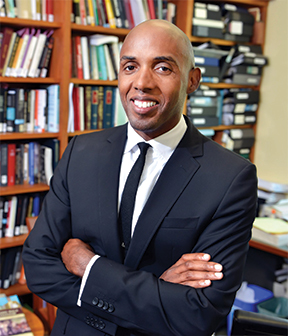Practicing Change
A prolific scholar and award-winning teacher, Devon Carbado explores the intersection of law, race, and inequality.
The legal profession was not Devon Carbado’s first career choice. Growing up in England in a working class, immigrant family—“first-generation everything”—he opted for a JD because he feared his parents wouldn’t see his dream of pursuing a doctorate in history as practical. Yet by the time he reached his 3L year at Harvard Law School, he still felt a pull toward academia. Nearly three decades later, Carbado’s career is a brilliantly woven combination of scholarly and pedagogical excellence and wider social commentary.
Carbado is one of the nation’s “finest scholars of criminal law and criminal procedure,” says former colleague David Sklansky, now a professor at Stanford Law School. Since 1997, Carbado has taught at UCLA School of Law, holding the chair title of the Honorable Harry Pregerson Professor of Law. Now, after teaching at NYU Law as a visiting professor in Spring 2024, Carbado will join the Law School as Elihu Root Professor of Law in Spring 2025.
Carbado’s broader work centers on complex dimensions of inequality and how they influence and inform law and society. In addition to numerous scholarly articles, he has authored and edited more than half a dozen books that have shaped the national conversation on race and inequality. In 2003, Carbado brought new attention to civil rights activist Bayard Rustin, who introduced Martin Luther King Jr. to the precepts of nonviolence, by co-editing an edition of Rustin’s writings, Time on Two Crosses. More recently, Critical Race Judgments: Rewritten US Court Opinions on Race and the Law (Cambridge University Press, 2022), which Carbado co-edited, reimagines landmark US Supreme Court decisions using the lens of critical race theory. His book Unreasonable: Black Lives, Police Power, and the Fourth Amendment (New Press, 2022) was described by Erwin Chemerinsky, dean of UC Berkeley School of Law, as “the clearest, most forceful explanation I have seen about what the failure to constrain the police means for people’s lives.”
“I’m interested in thinking about how law intersects with inequality,” Carbado says. “It’s hard to understand constitutional law, for example, without thinking about how, over time, different forms of inequality have been a part of our constitutional story, whether it’s slavery or Chinese exclusion or Jim Crow or Japanese internment or inequality on the basis of gender and sexual orientation. The hard truth of the matter is that there are moments in our American journey where constitutional law functioned as the vehicle through which inequality was effectuated.”
At UCLA, Carbado was twice elected Professor of the Year by the law school’s graduating class and also received the universitywide Distinguished Teaching Award, with special notation as the recipient of the Eby Award for the Art of Teaching. “Clearly, I have the responsibility to dispense a certain baseline of knowledge to my students. But it’s also important for students to understand that they learn from each other, and that we learn collectively as well,” Carbado says. “So my goal is to find ways to engage students that signals to them that they are not simply receptacles of knowledge; they co-create it. Advancing that goal requires that I do my very best to create a classroom context in which students are willing to make themselves vulnerable, offer their own views, subject those views to challenge and contestation, and listen to and take seriously the perspectives of others.”
A former vice dean of UCLA Law, Carbado also served as an associate vice chancellor for the broader university. His professional acumen and understanding of the student experience made him a valuable administrator, says former UCLA Law dean Rachel Moran, now a distinguished professor emerita at University of California, Irvine School of Law.
“Devon Carbado is not just an important scholar and a gifted teacher, he is also an institution-builder,” Moran says. “He ensures that there are structural supports for inclusive and far-ranging discourse on diversity, equity, and inclusion in legal education. NYU Law is fortunate to have him!”—Shonna Keogan
Posted September 10, 2024. Photo: UCLA School of Law


